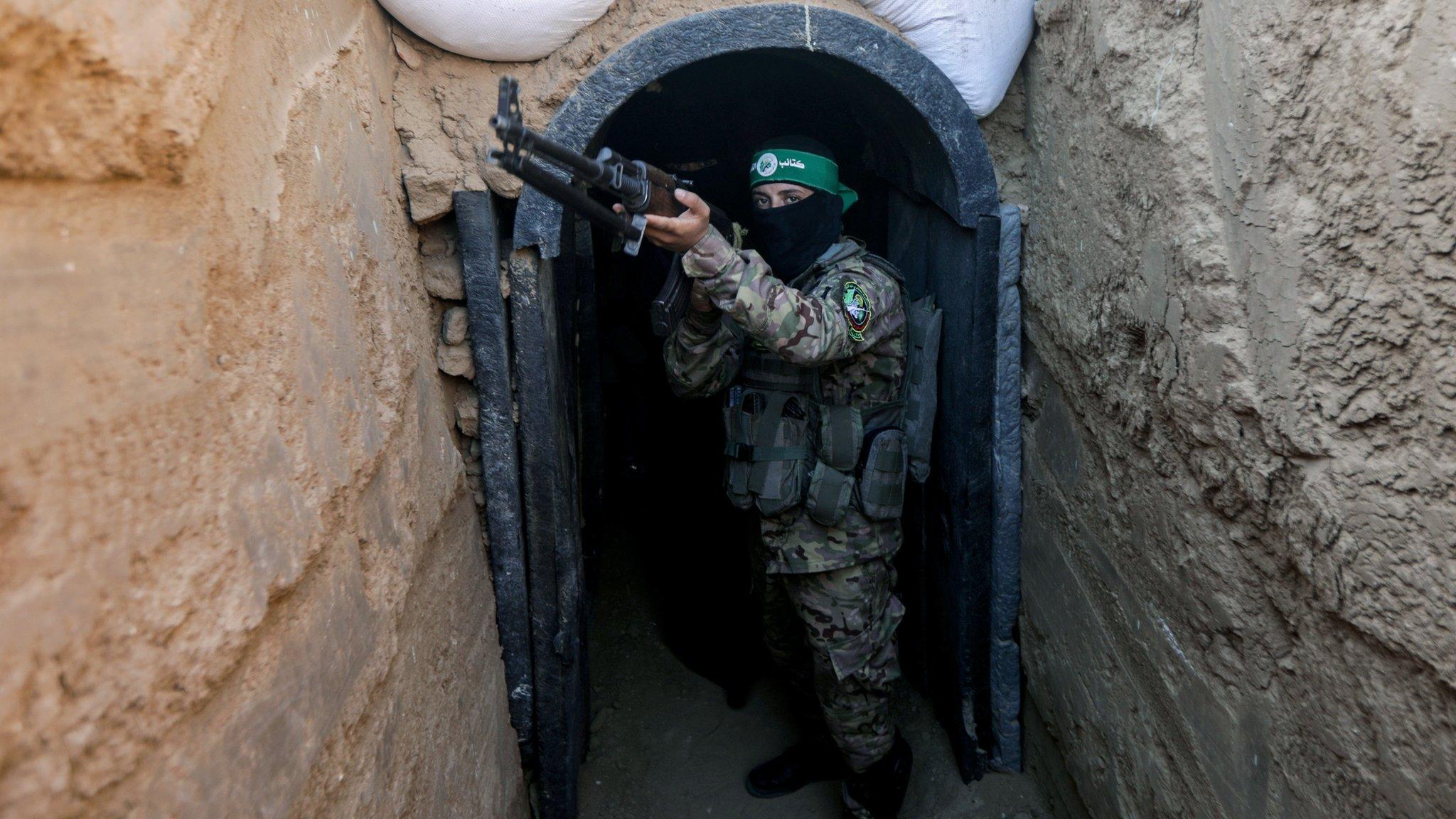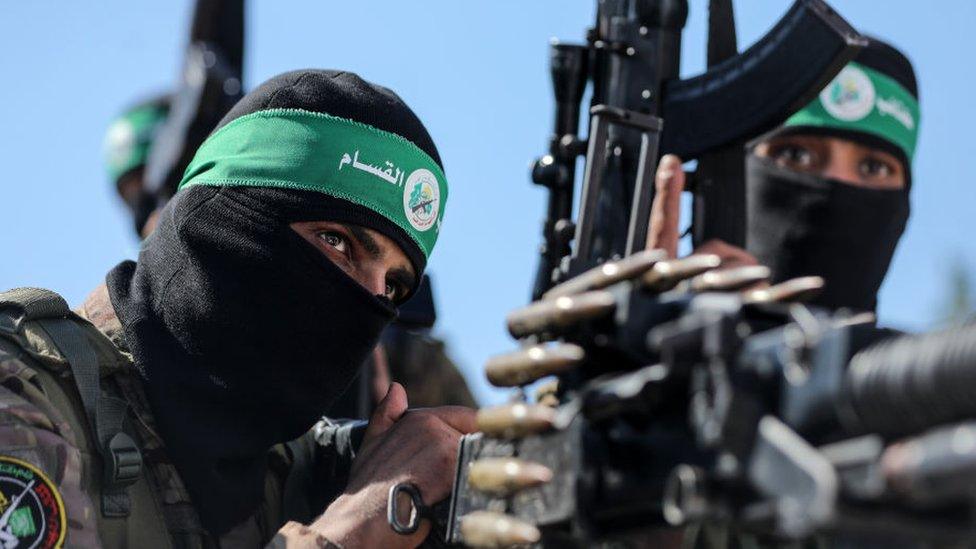How would an Israeli ground assault on Gaza unfold?
- Published
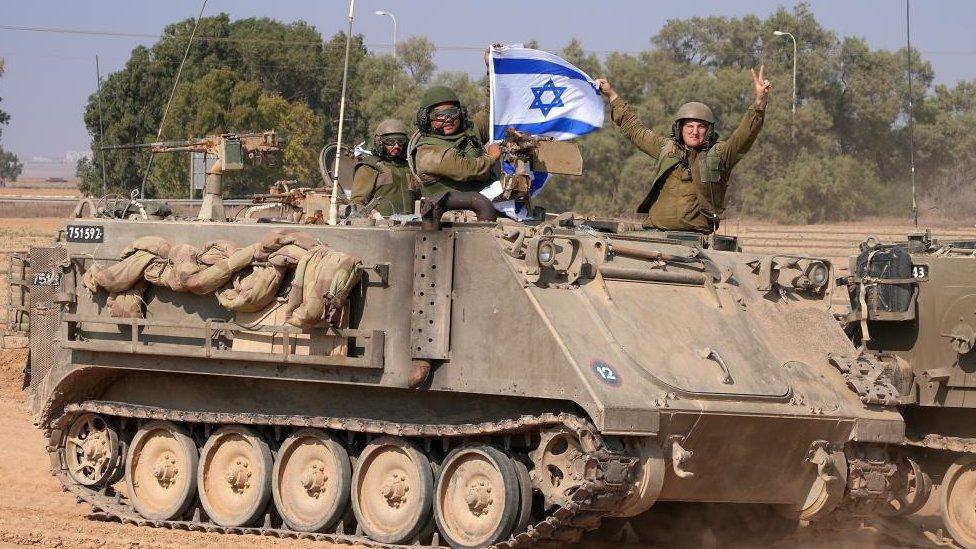
Israel is massing troops and equipment near the Gaza Strip
Israel appears to be preparing for a ground invasion into Gaza.
Its military is telling 1.1 million people in the north of the strip to relocate south in the next 24 hours. Meanwhile it is massing tens of thousands of troops, tanks and artillery on the edge of the territory.
But sending ground forces into Gaza's densely populated urban areas is an operation fraught with peril.
The scope of a potential ground assault is also still not clear - how far would the incursion go and for how long?
When could it happen?
The choreography necessary for a ground assault has started.
Major General Amos Gilead, a veteran of the Israel Defence Forces (IDF) and previous operations inside Gaza, says the first task for Israel was to create a unity government to get public backing for what happens next.
Recent high level diplomatic visits by senior US and European politicians have allowed Israel to shore up international support, though that solidarity could waver the longer this war goes on and as civilian casualties mount. Significant Israeli military casualties in any military operation will also test its own resolve.
As for military preparations, Israel has already massed its forces near the border with Gaza. Some 300,000 reservists have been activated, alongside a standing force of more than 160,000.
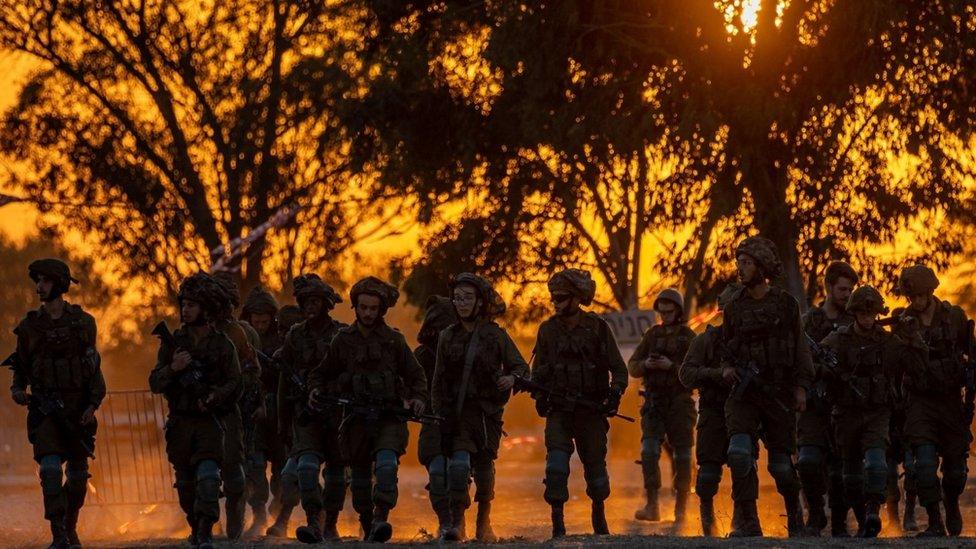
Israeli soldiers patrol the area of an attack that killed more than 260 people at a music festival
We talked to some of the recently arrived reservists in the south - their morale appears to be high, and they're ready to fight.
Nissim was in Sri Lanka when he first heard the news of the Hamas attack, but took the first plane back to Israel to join his unit. "This is our home. We have to fight for it," he says.
Shuki left his sales job straight away. "We would love to have peace," he told me. "Unfortunately, that's not possible. We enjoy life, so we need to fight for the right to live."
Israel seems united in the need for action, but the clock is ticking while they await their battle orders. The longer troops wait, the harder it will be to maintain readiness and morale.
Israel's warning to Palestinians living in Gaza to flee south is an indication that the next phase of its military operation is imminent.
Preparations for the assault
Israel's first task was to secure its own territory and to kill, or capture and interrogate Hamas fighters who crossed the border and killed more than 1,300 people and kidnapped at least 150.
Israel's already been conducting intense air strikes targeting Hamas' military hierarchy and infrastructure. Over the past six days its air force has dropped more than 6,000 bombs on Gaza. As a comparison, Nato allies released 7,700 during the entire war in Libya in 2011.
More than 1,500 people have been killed in Gaza in the air strikes so far.
Plans for the invasion itself will be a closely guarded secret, but Israel has been getting ready for years. It's been training troops in a multi-million dollar urban warfare centre in the south, dubbed mini-Gaza.

More on Israel Gaza war
Follow live: Latest updates
History behind the story: The Israel-Palestinian conflict
Kibbutz massacre: Father saves daughter he had not seen in six years

There they have learnt how to fight through a maze of tightly packed buildings and tunnels, of which Hamas is believed to have built more than 1,000.
Yaakov Katz, a former editor of the Jerusalem Post and the author of several books on Israel's military, says the military has been configured to operate for this very purpose in specialist brigades - combining engineers with armoured bulldozers working alongside tanks and infantry.
Urban battlefield and tunnels
Major General Yaakov Amidror - a former IDF commander and national security advisor - acknowledges that fighting Hamas will be tough. Hamas will have laid booby traps and Improvised Explosive Devices at entrance points and along narrow streets, he says.
Israel believes Hamas has around 30,000 troops. Their weapons include automatic rifles, rocket propelled grenades and anti-tank missiles - some of Russian origin like Kornets and Fagots.
Hamas also still has large stockpiles of rockets which they've been firing into Israel. Yaakov Katz says Hamas has also been producing its own small drones - including suicide ones. He says Hamas may also have a very limited supply of short-range shoulder-launched surface-to-air missiles. What they do not have is armoured vehicles, tanks and artillery - unlike Israel.
But the challenge for Israel will be close-quarters fighting in densely populated urban areas.
Israel has specialists teams for tunnel warfare, including an engineering unit called Yahalom, and Oketz which specialises in canine combat.
Mr Katz says Israeli troops will avoid going into tunnels unless they have to, not least because Hamas will know them better. Instead tunnels will be destroyed by pouring down explosives.
Fate of hostages
The fate of the hostages taken from Israel complicates any ground assault.
Maj Gen Gilead was involved in the negotiations which eventually led to the release of an Israeli soldier, Gilad Shalit, who was held by Hamas for five years from 2006 to 2011. He was eventually exchanged for more than 1,000 Palestinian prisoners.
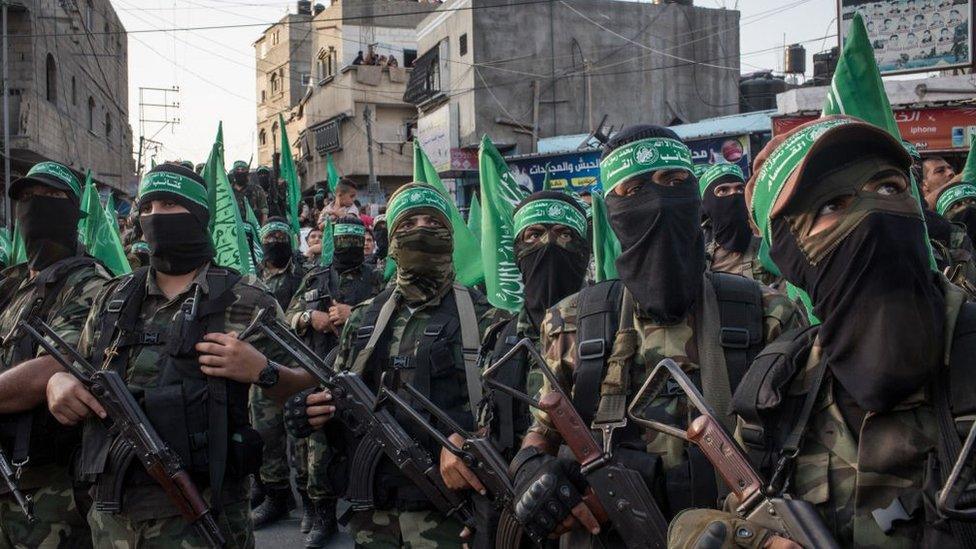
Israel's stated goal is to destroy Hamas
Maj Gen Gilead says while the military will need to take their fate into consideration, "if we don't do something concrete, we might find ourselves with more challenging problems".
But Maj Gen Amidror says the hostages will not prevent any action. "We will fight Hamas to the end and we will have to find those hostages during the operation."
What is Israel's aim?
Israel's stated goal is to destroy Hamas.
Maj Gen Gilead, who served in the IDF for 30 years, says that goes beyond previous Israeli operations inside Gaza, which were "mainly about containment".
This time he says "we need to do something far more dramatic". Decisive military action he believes would also deter Israel's other enemies in the region - namely Hezbollah and Iran.
Mr Katz believes Israel's goals will be more pragmatic - making sure that Hamas never has the military capability to attack Israel again. He says Israel "doesn't want to re-occupy Gaza, and have to take care of two million people who are hostile to it".
However, recent history suggests invasions very rarely go according to plan.
Even the world's most advanced militaries can soon get bogged down - look at what happened to the US in Iraq and Afghanistan, and more recently Russia in Ukraine.
A military operation inside Gaza, which is only 25 miles (40 km) long, is not on that scale, but the outcome is far from clear, says Lieutenant General Sir Tom Beckett of the Institute of Strategic Studies.
"In truth, there are no good options for an Israeli ground offensive in Gaza. No matter how successful the operation proves in defeating Hamas as a military organisation, Hamas's political imperative and the population's support for the resistance will continue.
"Israel either reoccupies Gaza to control it or, by withdrawing after an offensive, cedes ground to people for whom the resistance is existence."

Are you personally affected by the issues raised in this story? If it is safe to do so, please get in touch by emailing haveyoursay@bbc.co.uk, external.
Please include a contact number if you are willing to speak to a BBC journalist. You can also get in touch in the following ways:
WhatsApp: +44 7756 165803
Tweet: @BBC_HaveYourSay, external
Please read our terms & conditions and privacy policy
If you are reading this page and can't see the form you will need to visit the mobile version of the BBC website to submit your question or comment or you can email us at HaveYourSay@bbc.co.uk, external. Please include your name, age and location with any submission.

- Published16 January
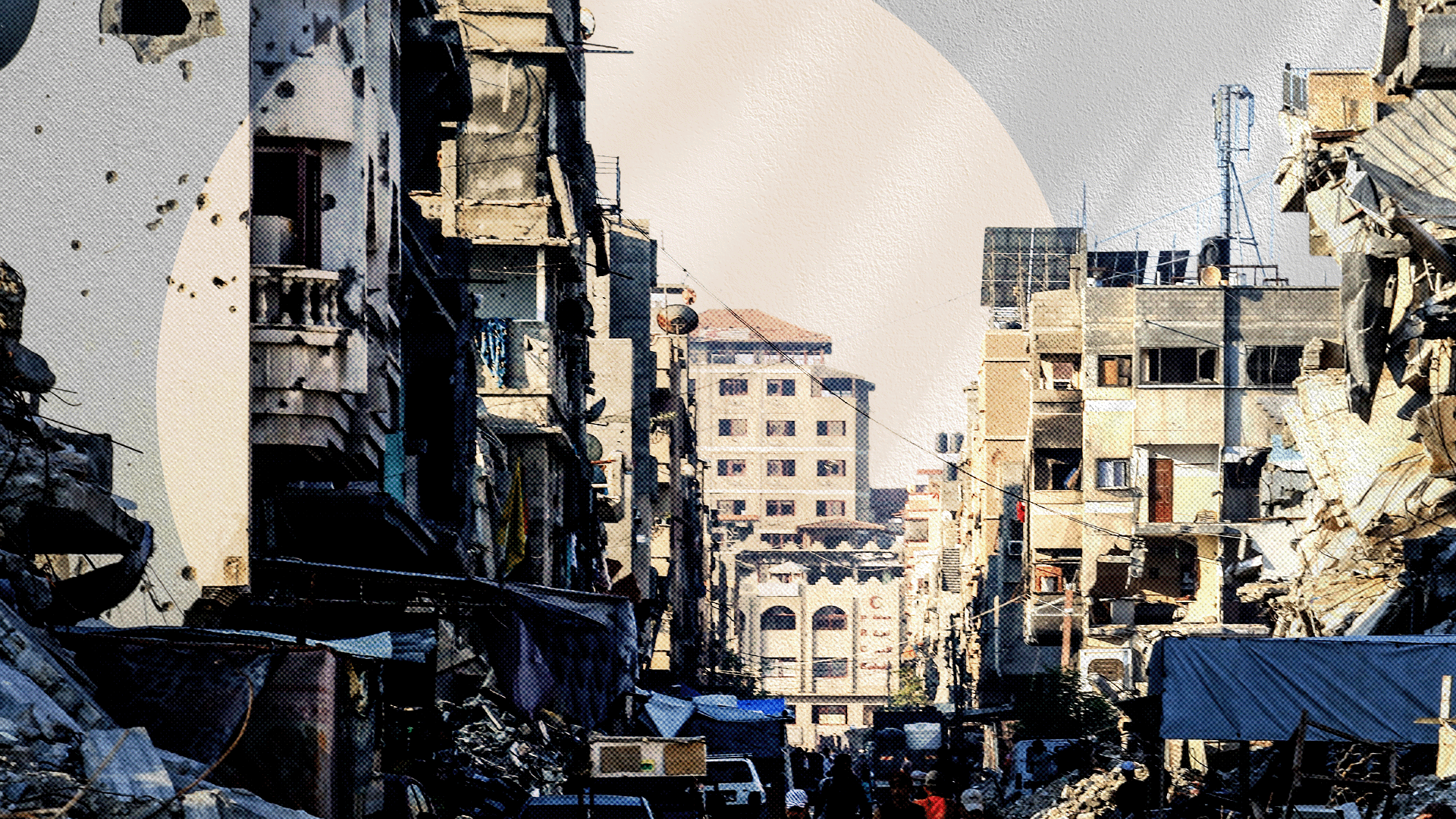
- Published13 October 2023
